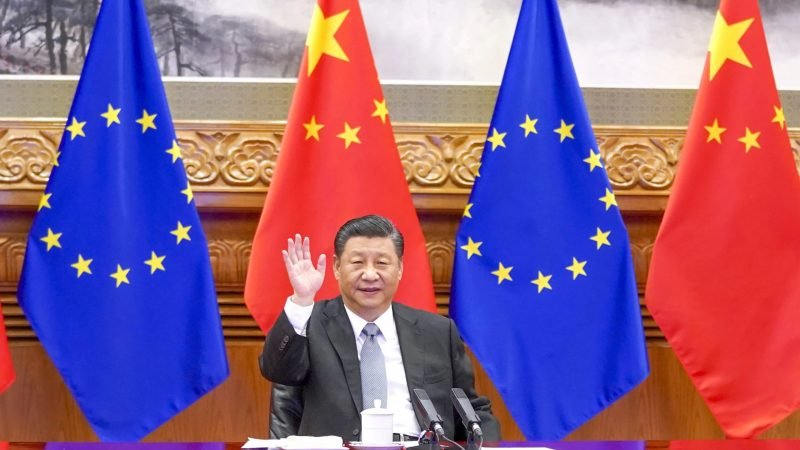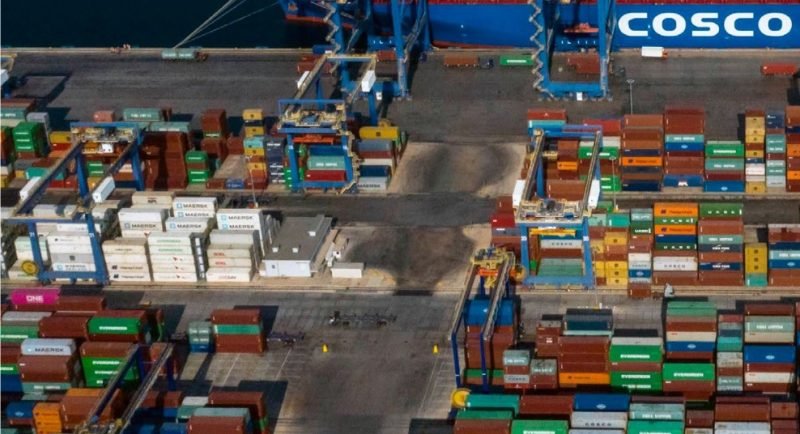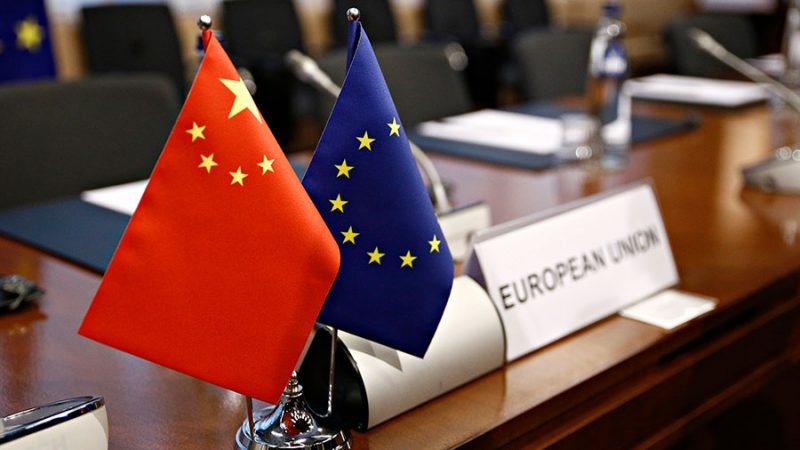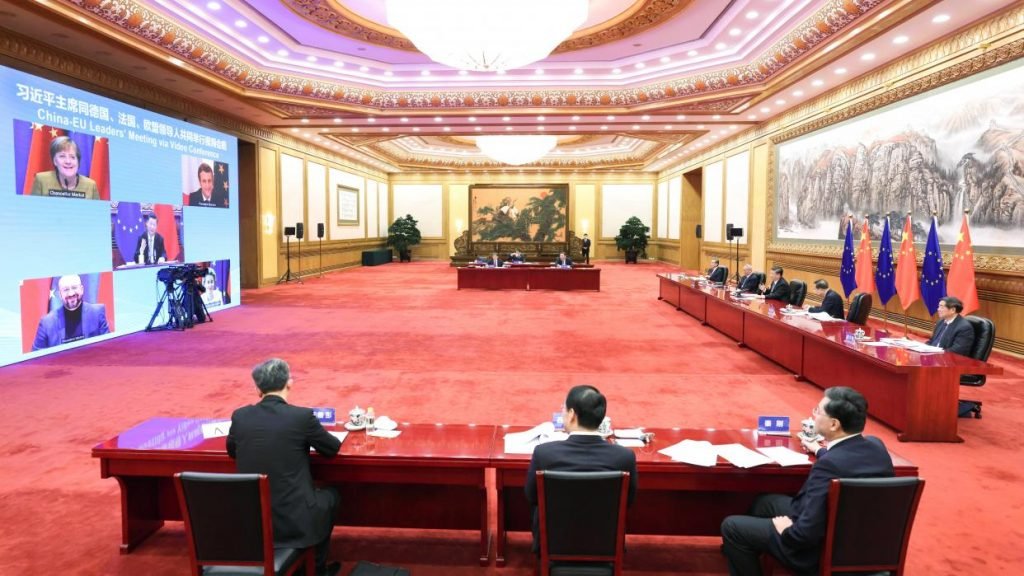CAI, like BRI, is a slavery trap

Comprehensive Agreement on Investment (CAI) signed between democratic and liberal European Union and authoritarian communist-ruled People Republic of China (PRC), the world’s two largest economies, in the last week of 2020, which is also the last week of German Chancellor Angela Merkel’s rotating six months term as EU President, after long seven years of negotiations and 35 sittings, has been considered by many as a slavery trap laid by present China’s extremely belligerent and second paramount leader Xi Jinping. Before Xi, Mao Zedong, the founder of PRC, who ruled from 1949 to 1976 or till his last breath, was the only other paramount leader as he had consolidated all power of the state in his hands, and during his tenure, the human civilization had experienced large-scale human right violation and massacres (Ref: Big Leap Forward) in China apart from the territorial expansion of PRC towards north, west and south, but towards the east, thank to the US security guarantee to Taiwan, Japan and Philippines. The brutalities in China during Mao’s regime were so unbearable that she was almost given a pariah status in so far as diplomatic relation, investment, trade and commerce, and technology transfer were concerned with democratic as well as developed economies for near about three decades. Again, after more than three decades break of absolute authoritarian rules, the present ruler of PRC, Xi Jinping, who exhibits no less Mao’s tendency, has consolidated all the state powers in his hands along with getting amended Chinese constitution to rule the country for life.

Belt and Road Initiative (BRI)
Prior to CAI, Xi Jinping, since his ascendancy to nation’s most powerful position that is General Secretary of Communist Party of China (CPC) to start with in 2012, has launched most ambitious worldwide infrastructure projects -ever conceived in world history- called Belt and Road Initiative (BRI) or 21st Century’s New Silk Road, which is branded by a large number of experts as nothing less than Debt Diplomacy or a slavery trap of underdeveloped and developing nations, majority of them -including February 01 2021 military coup in Myanmar in which case PRC hand can’t be ruled out as during the January visit to the country Chinese FM Wang Yi while interacting with Myanmar powerful General called the two countries ‘brothers’ while praising the military’s ‘national revitalization’ – are ruled by corrupt dictators and authoritarian rulers. The BRI targeted countries since start of their self-rule have been to a great extent deprived of infrastructure development investments. For example: Asian Development Bank in 2017 estimated a financing gap in economic infrastructure of $459 billion per year for Asia. The gap almost doubles to $907 billion with the expected need for funding of social infrastructure. And wherever there is investments, projects implementation were marred due to corruptions, lack of guarantee for return on investment, bad administration or project management and armed insurgencies.
So far total Chinese investment in the BRI projects estimated to be $200 billion while Morgan Stanley has predicted Communist China’s overall expenses over the life of the projects could be in the region of $1.2 to $1.3 trillion by 2027. For the Chinese paramount leader, the BRI serves as pushback against the much talk about the US’s ‘Pivot to Asia’ started during Barack Obama days in The White House. This is, as alleged by experts, primarily for China to develop new investment opportunities, develop export markets, and increase domestic incomes and consumption back in China. But, the Council on Foreign Relation (CFR)’s Elizabeth C. Economy opines, “Under Xi, China now actively seeks to shape international norms and institutions and forcefully asserts its presence on the global stage.” To substantiate Elizabeth’s apprehension, I would like to quote Pakistan’s Major General Ayman Bilal’s recent statement “China has paid me a salary and a large sum of money and officially posted me to end within six months the freedom struggle by Baloch people and thwart Iran’s conspiracies against China Pakistan Economic Corridor (CPEC) in order to establish stability in the region”.
It is a different matter that majority of the BRI projects aren’t moving in right spirit in most of the sites and countries as local oppositions to the same started raising their violent heads partly due to fear of debt trap and partly due to memory of European colonial age economic exploitation and socio-cultural-political slavery, and in cases of Central Asian countries in particular due to erstwhile Union of Soviet Socialist Republic (USSR)’s draconian ideological slavery in 20th Century. Now, it is difficult to predict how far the BRI would be useful for 21st century Middle Kingdom’s Wolf Warrior ambition of developing modern war machinery to win the battle anywhere in the world by 2049, the centenary year of foundation of PRC. However, the conqueror’s ambition is such that it does not rest till the same is accomplice or he gets perished. And all those at a great costs to human lives and economies as seen in WW-II.

Comprehensive Agreement on Investment (CAI)
Here, it’s necessary to mention that negotiation for CAI initiated by China a la BRI started simultaneously in 2013. But, CAI could not match the speed of BRI primarily because it was targeted at developed-democratic-liberal as well as economically and socially well-to-do European Union, and China was not ready to compromise on its domestic political and trade governance models and practices, which are authoritarian and protectionist respectively, that the EU had made its early condition to China to give up. During the just-concluded tenure of Donald Trump in The White House, the long and traditional trans-Atlantic bonhomie between two developed economies among liberal-democratic countries -persisting since World War II- was badly stained due to his ‘America First’ policies. Similarly, Trump administration imposed restriction for trade on China for her unfair trade practices. As both economic blocks faced the challenges from the world’s largest economy, which is a major source of world’s investable capitals and modern technologies, they thought -as it is presumed by many including this author- some compromise here and there may be accepted for business and trade that led to the signing of Comprehensive Agreement on Investment. The late steaming of the negotiation with the German Chancellor’s personal involvement raised many eyebrows. German is the largest trading partner with China from the EU block. This is why many allege German has prioritized CAI over liberal democracy it practices and values back home, and human right violations in China.

Now, the proponents of CAI say with more and more Chinese integration with the world economy, more China will get liberalized and democratize. This was the argument of the US President Richard Nixon in 1970s when he visited China to open trade, business and investment channels with later, German Chancellor Helmut Kohl’s after the groundbreaking for Volkswagen factory in Shanghai in 1980s, and Bill Clinton and George W. Bush after allowing China entry into WTO in 2000s. But, nothing changed in the Chinese attitude. Instead, CPC has been more aggressive, and Xi Jinping has been planning to build PLA to such a great fighting force that it can win the battle anywhere in the world by 2049. In the meanwhile, China has got territorial conflicts with almost all neighbours and virtually occupied the resource-rich South China Sea refusing the right on the sea of all littoral states and sabre-rattling them and refuses to comply with time-tested International Laws governing international water bodies. Even, she refuses to comply with international tribunal’s dictate with mocking comment, a character of a brutal dictatorial regime. Despite all the above, if still EU and German leadership thought PLA’s accumulating strength powered by PRC’s economic growth due to expanding trade and commerce facilitated by developed nations for future liberalization and democratization of China, then what it happening in Pakistan’s Baluchistan due to BRI, the same may not be ruled in EU due to CAI in decades to come.


















